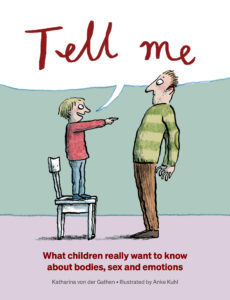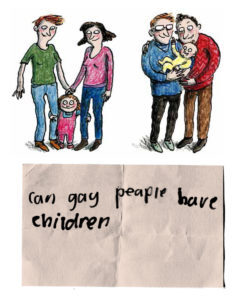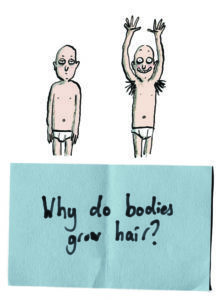 Sexuality, bodies and puberty are delicate subjects. Many find them embarrassing, awkward or even too controversial to talk about, let alone with their children.
Sexuality, bodies and puberty are delicate subjects. Many find them embarrassing, awkward or even too controversial to talk about, let alone with their children.
I am an aunt and I have full respect for parents and the tightrope they must walk, and of course there is no one way that is right. Yet instinctively (and from my reading) I feel that leaving children to figure things out on their own is not the best tactic when it comes to matters of puberty, consent and sexuality – it seems to me that the norm in children’s books is to present a different world than the one we experience in the playground or the sandpit or the world at large.
As a child, I recall the feeling of strength when adults treated me and my friends with honesty. Certainly children instinctively avoid worthiness and sham, as we know from the old story of The Emperor’s New Clothes.
 While talking about sex and puberty is not comfortable, it doesn’t need to be made dull, and humour helps a lot. Bodies are pretty funny. Many of us have recollections of either no information or dull information: the Little Red Schoolbook was perfect for me, though I haven’t seen it around since I was 13.
While talking about sex and puberty is not comfortable, it doesn’t need to be made dull, and humour helps a lot. Bodies are pretty funny. Many of us have recollections of either no information or dull information: the Little Red Schoolbook was perfect for me, though I haven’t seen it around since I was 13.
Initially Gecko Press chose to publish Tell Me because it made us laugh. Then we realised these were real questions asked by eight year olds – astonishing! Then we thought how fantastic it is to be able to laugh at uncomfortable topics. And we thought about children who are not told enough and are sent out into the world without the tools they need to act in a way that is good for them.
In the process of making this book, we’ve realised that pre-puberty is a perfect time to learn about bodies and associated rights. Once children are in the thick of puberty, it becomes much more embarrassing. Younger children seem to take more in their stride. Our experience is that we don’t need to be as careful with this topic – or any topic – as many of us think.
 Author Katharina von der Gathan, when asked whether children are easier to talk to than adults about bodies, sex and emotions, says:
Author Katharina von der Gathan, when asked whether children are easier to talk to than adults about bodies, sex and emotions, says:
“Children who haven’t yet reached puberty are usually very open and approachable on these topics. They are incredibly curious. Later, during puberty, other things come up: insecurities with their own bodies and maybe even difficult experiences. How to talk about sexuality and feelings isn’t something people learn about at school or at home. I often notice this at parents‘ evenings: many parents would like to do the right thing by their children in this important area. But they often feel insecure about the best way to do it.”
When asked: “As a sex educationist what have you observed about children and their curiosity about bodies, sex and emotions?” she says:
“Sexuality is everywhere in our society: advertising at the bus stop, gay parents in a TV series, a sexist insult in the schoolyard, or when an older sister is making out with a boyfriend. These different situations naturally generate a plethora of questions in children that they then carry around with them. But the message they get everywhere is: ‘This is not for you!’
“It’s been my experience that children ask many questions once they realize they are being taken seriously.”
 And what is the question you are most commonly asked?
And what is the question you are most commonly asked?
“There isn’t one question, but there are two main areas that are always the focus:
One is about the children themselves and the physical changes in puberty (e.g. ‘When does hair grow under your armpits?’ or ‘Is puberty awful?’). The other is about adult sexuality (e.g. ‘How does sex work?’ or ‘Why is sex nice?’).”
For a full Q and A with Katharina on Tell Me, please see: Sex educationist reveals what kids really want to know about sex – and it might surprise you
Tell Me is the sort of book you can either leave lying around, knowing it will safely do the job for you, or you can read it together with your child or in a class, or with friends. Or all of the above.
 This book is bold in its humour and it is frank.
This book is bold in its humour and it is frank.
The cartoons are not meant to be taken too seriously, and they are countered by the gentle directness of the text. The answers to questions children themselves have asked are impartial, factual, non-judgmental, and respectful of different points of view.
This book is a starting point for conversations, not a how-to or a what-am-I.
In recent years, conversations around sexuality and puberty have changed significantly and we wanted this book to be as open and inclusive as possible to reflect this.
At Gecko Press, Rachel worked with sexuality educators in North America and New Zealand; Katharina added some new questions children had asked her, and illustrator Anke Kuhl added new images to match. We thank them for their willingness to work with us on this.
Everyone who picks up this book will feel differently. We hope you find it helpful and funny, and that it goes some way to bringing some light to this topic which affects every one of us and deserves to have a little time in the open, not be parked up behind closed doors.
Julia Marshall

